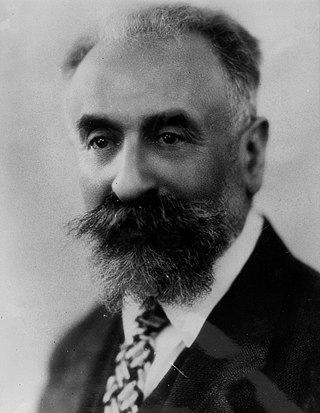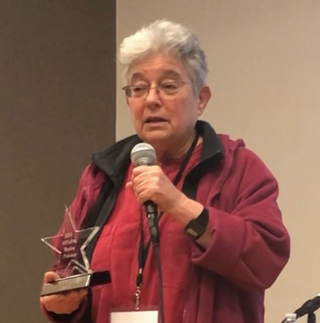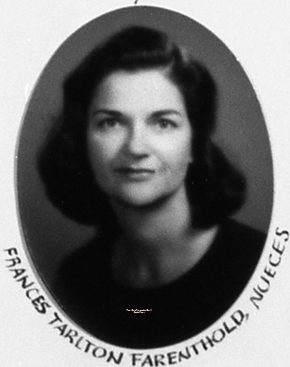Related Research Articles

Julia Kristeva is a Bulgarian-French philosopher, literary critic, semiotician, psychoanalyst, feminist, and novelist who has lived in France since the mid-1960s. She has taught at Columbia University, and is now a professor emerita at Université Paris Cité. The author of more than 30 books, including Powers of Horror, Tales of Love, Black Sun: Depression and Melancholia, Proust and the Sense of Time, and the trilogy Female Genius, she has been awarded Commander of the Legion of Honor, Commander of the Order of Merit, the Holberg International Memorial Prize, the Hannah Arendt Prize, and the Vision 97 Foundation Prize, awarded by the Havel Foundation.

Matriarchy is a social system in which positions of dominance and privilege are held by women. In a broader sense it can also extend to moral authority, social privilege, and control of property. While those definitions apply in general English, definitions specific to anthropology and feminism differ in some respects.

Teresa de Lauretis is an Italian author and Distinguished Professor Emerita of the History of Consciousness at the University of California, Santa Cruz. Her areas of interest include semiotics, psychoanalysis, film theory, literary theory, feminism, women's studies, lesbian- and queer studies. She has also written on science fiction. Fluent in English and Italian, she writes in both languages. Additionally, her work has been translated into sixteen other languages.

Marcel Israël Mauss was a French sociologist and anthropologist known as the "father of French ethnology". The nephew of Émile Durkheim, Mauss, in his academic work, crossed the boundaries between sociology and anthropology. Today, he is perhaps better recognised for his influence on the latter discipline, particularly with respect to his analyses of topics such as magic, sacrifice and gift exchange in different cultures around the world. Mauss had a significant influence upon Claude Lévi-Strauss, the founder of structural anthropology. His most famous work is The Gift (1925).

The Goddess movement is a revivalistic Neopagan religious movement which includes spiritual beliefs and practices that emerged primarily in the United States in the late 1960s and predominantly in the Western world during the 1970s. The movement grew as a reaction both against Abrahamic religions, which exclusively have gods who are referred to using masculine grammatical articles and pronouns, and secularism. It revolves around Goddess worship and the veneration for the divine feminine, and may include a focus on women or on one or more understandings of gender or femininity.

Charlotte Anne Bunch is an American feminist author and organizer in women's rights and human rights movements. Bunch is currently the founding director and senior scholar at the Center for Women's Global Leadership at Rutgers University in New Brunswick, New Jersey. She is also a distinguished professor in the Department of Women's and Gender Studies at Rutgers.

Gayle S. Rubin is an American cultural anthropologist, theorist and activist, best known for her pioneering work in feminist theory and queer studies.
The University of Texas School of Law is the law school of the University of Texas at Austin, a public research university in Austin, Texas. According to Texas Law’s ABA disclosures, 87.20% of the Class of 2022 obtained full-time, long-term bar passage required employment nine months after graduation.

Frieda Lindfield Werden is an American and Canadian radio producer. She is the co-founder and producer of the weekly radio series WINGS: Women's International News Gathering Service, which debuted in 1986 and has been in weekly syndication for more than twenty-seven years. Produced by and about women, WINGS broadcasts on non-commercial radio stations worldwide.

Mary Frances Tarlton "Sissy" Farenthold was an American politician, attorney, activist, and educator. She was best known for her two campaigns for governor of Texas in 1972 and 1974, and for being placed in nomination for vice president of the United States, finishing second at the 1972 Democratic National Convention. She was elected as the first chair of the National Women's Political Caucus in 1973.

The Myth of Matriarchal Prehistory: Why An Invented Past Will Not Give Women a Future is a 2000 book by Cynthia Eller that seeks to deconstruct the theory of a prehistoric matriarchy. This hypothesis, she says, developed in 19th century scholarship and was taken up by 1970s second-wave feminism following Marija Gimbutas. Eller, a retired professor of religious studies at Claremont Graduate University, argues in the book that this theory is mistaken and its continued defence is harmful to the feminist agenda.

A matriarchal religion is a religion that emphasizes a goddess or multiple goddesses as central figures of worship and spiritual authority. The term is most often used to refer to theories of prehistoric matriarchal religions that were proposed by scholars such as Johann Jakob Bachofen, Jane Ellen Harrison, and Marija Gimbutas, and later popularized by second-wave feminism. These scholars speculated that early human societies may have been organized around female deities and matrilineal social structures. In the 20th century, a movement to revive these practices resulted in the Goddess movement.
Heide Göttner-Abendroth is a German feminist advocating matriarchy studies, focusing on the study of matriarchal or matrilineal societies.

Genevieve Fiore (1912–2002) was an American women's rights and peace activist, who was the founder, and served as the executive director, of the Colorado Division of United Nations Educational, Scientific and Cultural Organization (UNESCO). Her UNESCO Club was founded in the year the clubs were first conceived and was the third organization established in the world. In 1967 she was honored as one of the inductees for the Colorado Women of Achievement Award. She was knighted by Italy in 1975 receiving the rank of Cavaliere dell'Ordine della Stella d'Italia. In 1991, she was inducted into the Colorado Women's Hall of Fame for her many years of peace activism and work with women's rights issues.
Annette Barbara Weiner née Cohen was an American anthropologist, Kriser Distinguished Professor of Anthropology, chair of the Anthropology Department, dean of the social sciences, and dean of the Graduate School of Arts and Science at New York University. She was known for her ethnographic work in the Trobriand Islands and her development of the concept of inalienable wealth in social anthropological theory.

Susan Petrilli is an Italian semiotician, professor of philosophy and theory of languages at the University of Bari, Aldo Moro, Italy, and the seventh Thomas A. Sebeok Fellow of the Semiotic Society of America. She is also International Visiting Research Fellow at the School of Psychology, the University of Adelaide, South Australia.

Luciana Percovich is an Italian non-fiction writer, a teacher, a translator and director of a series of books on women's history and spirituality. She was born in Gorizia, Italy in a Mitteleuropean Italian speaking family forced to leave Fiume, Rijeka at the end of World War II, with cultural and geographical roots in Austria and Dalmatia, she spent her childhood and adolescence in Gorizia attending Classical studies. At the age of 18, she went to Milan to complete her education, and there she graduated in 1972. She has been defined as "a traveller between worlds and a weaver of space-time connections for her ability of embracing distant wide horizons with a loving insight".
Whatever I've done, it's been conceived within women's relations, in presence of women's bodies and in the flowing of awakened women's emotions.

Timorese wedding traditions apply to marriages on the island of Timor, which is divided between Indonesia and East Timor. The wedding traditions are still followed in about half of all marriages in East Timor. Ever since colonial times, there has been heated debate about the value of these traditions and the role of women in them.
The Traffic in Women: Notes on the "Political Economy" of Sex is an article regarding theories of the oppression of women originally published in 1975 by feminist anthropologist Gayle Rubin. In the article, Rubin argued against the Marxist conceptions of women's oppression—specifically the concept of "patriarchy"—in favor of her own concept of the "sex/gender" system. It was by arguing that women's oppression could not be explained by capitalism alone as well as being an early article to stress the distinction between biological sex and gender that Rubin's work helped to develop women's and gender studies as independent fields. The framework of the article was also important in that it opened up the possibility of researching the change in meaning of this categories over historical time. Rubin used a combination of kinship theories from Lévi-Strauss, psycho-analytic theory from Freud, and critiques of structuralism by Lacan to make her case that it was at moments where women were exchanged that bodies were engendered and became women. Rubin's article has been republished numerous times since its debut in 1975, and it has remained a key piece of feminist anthropological theory and a foundational work in gender studies.
Marsha Anne Gomez was a sculptor, art teacher, and activist. She is best known for her series, Madre del mundo .
References
- ↑ Women and the Gift Economy, ed. Genevieve Vaughan, Toronto: Inanna Publications and Education, Inc., 2007, pp. 1-37.
- 1 2 3 "Giving for Giving: The story of Genevieve Vaughan". www.youtube.com. Retrieved July 3, 2024.
- ↑ Bernard, Jeff. "Ferruccio Rossi-Landi and a Short History of the Rossi-Landi Network" (PDF). Archived from the original (PDF) on April 20, 2012.
- ↑ Vaughan, Genevieve, For-Giving: A Feminist Criticism of Exchange, 2002 edition, Anomaly Press and Plain View Press, p. 13.
- ↑ Vaughan, Genevieve, "Saussure and Vygotsky vis Marx," ars semiotica1981, where she gives a Marxist interpretation of Saussure's comparison of linguistic and economic value and looks at Vygotskyan concept development as the forming of a general equivalent structure
- ↑ "Communication and exchange", Semiotica 1980
- ↑ For-Giving(op cit.) pp. 13-14
- ↑ "Genevieve Vaughan , Intellectual Biography, 1968" . Retrieved July 3, 2024.
- ↑ For-Giving(op cit.), p 14
- ↑ For-Giving, 2002, p. 54
- ↑ Gift economy#Hyde
- ↑ For-Giving(op cit.) pp. 56, 156, 338
- ↑ Strategy, Platform. "Bold Giver Story: Genevieve Vaughan". Bolder Giving. Retrieved April 9, 2018.
- ↑ "WILPF- Women's International League for Peace and Freedom". Archived from the original on March 20, 2012. Retrieved April 9, 2018.
- ↑ "More than a Parley," by Kathleen Mahoney," in Community Development Journal, vol. 21, issue 1, pp. 56-58
- ↑ "The Nairobi Peace Tent 1984". gift-economy.com. Retrieved April 9, 2018.
- ↑ WINGS #05-02 Colombian Women on the Peace Boat, audio, Women’s International News Gathering Service, Feb. 2002
- ↑ Slavin, Sarah, U.S. women's interest groups: institutional profiles, pp. 517-518
- ↑ "Foundation for a Compassionate Society". gift-economy.com. Retrieved April 9, 2018.
- ↑ Foundation for a Compassionate Society, Feminist Family Values Forum, Austin: Plain View Press, 1996, 130 pp.
- ↑ "Video Archives of the Foundation for a Compassionate Society including many from the Foundation project, Let the People Speak". 1994.
several hours including February 22, 1994, 1134, "Public Testimony Before Texas Officials on Breast Cancer and Radiation" Part Three Sponsored by the Foundation of a Compassionate Society And Women's Environment and Development Organization (WEDO) Rosalie Bertell, Bill Addington, Sissy Farenthold, Dr Vladimir Chernousenko, Joan D'Argo.
- ↑ "Technomama". gift-economy.com. Retrieved April 9, 2018.
- ↑ "Museum". Archived from the original on August 7, 2008. Retrieved April 9, 2018.
- ↑ The Texas Legacy Project: Stories of Courage and Conservation, by Carter Smith, David A. Todd and David Weisman, p. 88.
- ↑ "Alma de Mujer, the Gift, Restoring Land to Indigenous People," in Indigenous Woman Magazine 2001
- ↑ "Gallery of Great Texas Women". utexas.edu. Retrieved April 9, 2018.
- ↑ "Goddess Temples around the World". Glastonbury Goddess Temple. Retrieved December 12, 2009.
- ↑ "Herstory of Sekhmet Temple in Nevada". Archived from the original on March 12, 2013. Retrieved November 15, 2011.
- ↑ "Nevada Desert Experience :: Programs :: Sacred Peace Walk". nevadadesertexperience.org. Retrieved April 9, 2018.
- ↑ "Board of Directors | the Feminist Press". Archived from the original on November 25, 2011. Retrieved November 25, 2011.
- ↑ "Closing the Foundation for a Compassionate Society". gift-economy.com. Retrieved April 9, 2018.
- ↑ For-Giving (op. cit.) Ch. 23
- ↑ "The Gift Economy," by Genevieve Vaughan, Ms. Magazine, May/June 1991
- ↑ For-Giving: A Feminist Criticism of Exchange, Austin: Plainview Press, 1997, 427 pages
- ↑ Vaughan, Genevieve, For-Giving: A Feminist Criticism of Exchange, 2002 edition, Anomaly Press and Plain View Press, 432 pp.
- ↑ Academic papers include "Communication and mothering," at the Semiotic Society of America, San Antonio, 2002; "Mothering, Co-muni-cation, and the gifts of language," in The Enigma of the Gift and Sacrifice, J.J. Goux and E. Wyschogrod eds., Fordham University Press. New York. 2002; "The Gift of the Gift", in Susan Petrilli and Patrizia Calefato eds. Logica, dilaogica, ideologica. I segni gra funzionalità ed eccedenza, Milano, Mimesis, 2003; and "Language as Gift and Community".in Lavoro immateriale. Athanor. Semiotica, Filosofia, Arte, Letteratura, anno XIV ns. n. 7, ed. Susan Petrilli 2003-4.
- ↑ "Motherhood Initiative for Research and Community Involvement". Archived from the original on December 29, 2011. Retrieved April 9, 2018.
- ↑ Heide Göttner-Abendroth#Matriarchal Studies
- ↑ "Homo Donans". gift-economy.com. Retrieved April 9, 2018.
- ↑ "Shifting the paradigm to a maternal gift economy" (PDF). July 7, 2011. Retrieved July 3, 2024.
- ↑ Vaughan, Genevieve (January 6, 2021). "The unilateral gift economy conjecture" (PDF). gift-economy.com. Retrieved November 10, 2021.
- ↑ "Position Statement for a Peaceful World". gift-economy.com. Retrieved April 9, 2018.
- ↑ Athanor Anno Xv, nuovo serie, n. 8, 2004
- ↑ Fournier, Valérie (2005). "Gift, She Said" (PDF). Ephemera. 5 (4): 655–551. Retrieved July 3, 2024.
- ↑ "The Gift Economy". gifteconomyconference.com. Retrieved April 9, 2018.
- ↑ Peggy Antrobus is author of the book The Global Women's Movement: origins, issues, and strategies, Zed Books (UK), 2004
- ↑ "WEAP - World Court of Women". Archived from the original on December 19, 2011. Retrieved November 29, 2011.
- ↑ Women and the Gift Economy: a radically different worldview is possible, ed. Genevieve Vaughan
- ↑ "A (M)otherworld is Possible: Two Feminist Visions". Archived from the original on April 26, 2012. Retrieved November 26, 2011.
- ↑ Vaughan, Genevieve (May 1, 2015). The Gift in the Heart of Language: The Maternal Source of Meaning. Mimesis International. ISBN 978-8869770128.
- ↑ "Videos | the Maternal Roots of the Gift Economy". Archived from the original on November 18, 2015. Retrieved 2015-11-17.